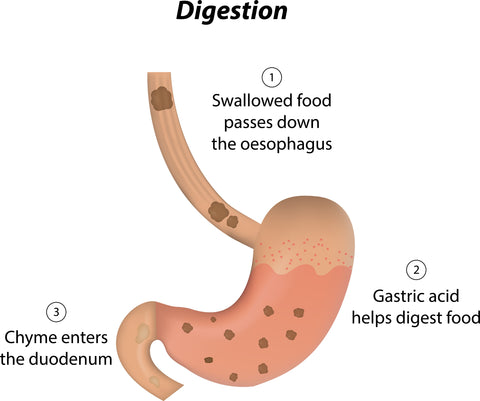Stomach (gastric) acid is a colourless, watery, acidic, digestive fluid produced in the stomach by the parietal cells. It is secreted together with several enzymes and intrinsic factors. This fluid has an acid solution with a pH of 1 to 2 in the stomach lumen (hollow region), consisting mainly of hydrochloric acid (HCl), and potassium chloride and sodium chloride. Stomach acid is quickly diluted in the presence of food to a pH range of 3.0 to 5.0.
 When food enters the stomach, this causes your stomach wall to expand which activates the secretion of stomach acid into the stomach. The stomach acid then activates an enzyme called pepsinogen which then becomes pepsin and helps digestion by breaking your proteins (proteins hold us together, without protein, we don’t exist) into small molecules for further digestion in the small intestines. This enzyme is only active within the pH range of 3.0 to 5.0 and requires the stomach acid to maintain that pH.
When food enters the stomach, this causes your stomach wall to expand which activates the secretion of stomach acid into the stomach. The stomach acid then activates an enzyme called pepsinogen which then becomes pepsin and helps digestion by breaking your proteins (proteins hold us together, without protein, we don’t exist) into small molecules for further digestion in the small intestines. This enzyme is only active within the pH range of 3.0 to 5.0 and requires the stomach acid to maintain that pH.
Pepsin is very specific in its action and is incapable of digesting food enzymes (these occur in raw food). Therefore, plant enzymes are not destroyed by the highly acidic environment of the stomach. They remain dormant until reaching the higher pH levels in the small intestine, where they become active and continue the digestive process.
Other functions of your stomach acid include sterilising the digestive tract, preventing overgrowth of pathogenic microorganisms, and improving absorption of vitamins and minerals.
The main factors that can contribute to insufficient stomach acid include:
- Stress, anxiety/worries, mental over-stimulation
- Nutrient deficiencies such as iodine, zinc, B-complex vitamins, selenium
- Over-consumption of caffeine or alcohol
- Medications like antacids, NSAID’s, proton pump inhibitors
- Not completely chewing your foods
- Not relaxing and enjoying your meals
- Over-consumption of nutrient devoid foods such as refined, processed, canned, packaged and fast food
- Naturally decreases with age
From there insufficient stomach acid can manifest with such common complaints and conditions as:
- Stomach aching/pain/discomfort or bloating after meals
- Frequent wind
- Feeling fatigued right after meals
- High protein or fatty foods cause nausea/stomach upset
- Undigested food in stool
- Reflux and/or heartburn
- Poor appetite or sense of fullness/heaviness after meals
- Multiple food sensitivities or allergies
- Trouble digesting meat
- Problems with bowel movement such as constipation or diarrhoea
- Frequent nausea
- Nausea after taking supplements (e.g. fish oil)
- Burping after meals
- Poor fingernail health/splitting easily/white flecks
- Skin conditions
- Bad breath
- Not feeling hungry at breakfast time
- Iron deficiency due to poor iron absorption
- Osteoporosis, resulting in part from decreased calcium absorption
- Failure to absorb minerals and trace elements. Minerals are the building blocks of your body. The trace elements are critical to the body's biochemistry.
- Failure to sterilise the stomach contents. Not being able to sterilise your digestive system makes you more susceptible to infections, parasites and overgrowths of pathogenic bacteria and viruses. If there is an overgrowth of bacteria and yeast in the stomach, then foods are more easily fermented instead of being digested, causing dysbiosis.
- Higher risk of Helicobacter pylori infection.
- Malabsorption of vitamin B12. Vitamin B12 has an elaborate way of binding to a hormone called intrinsic factor in your stomach. Bound with intrinsic factor, B12 will survive the journey through the stomach to reach the small intestine.
Paradoxically, those who have low HCL often think they have too much acid because they experience the same symptoms as those with too much HCL, such as indigestion, heartburn and belching.
Think of your stomach as the mother of your body. Then you can understand why stomach acid is so essential because, with an optimal functioning stomach, you will find that your body can fully break foods down, digest and absorb the nutrients with relative ease which is vital to human health and well-being.
To help cope with insufficient stomach acid consider adding herbal bitters to engage the digestive system and get those digestives juices flowing for the incoming food or a digestive enzyme (containing Betaine Hydrochloride and Pepsin) with each meal. Most importantly chew your food well to help support proper digestion.
The Root Of Good Health Starts In The Stomach!
 Skip to content
Skip to content